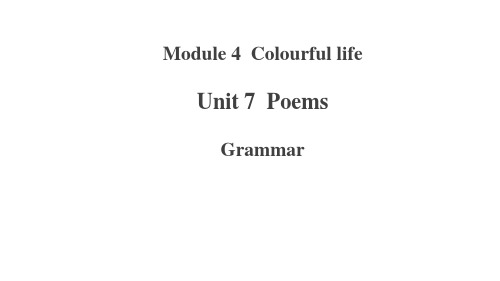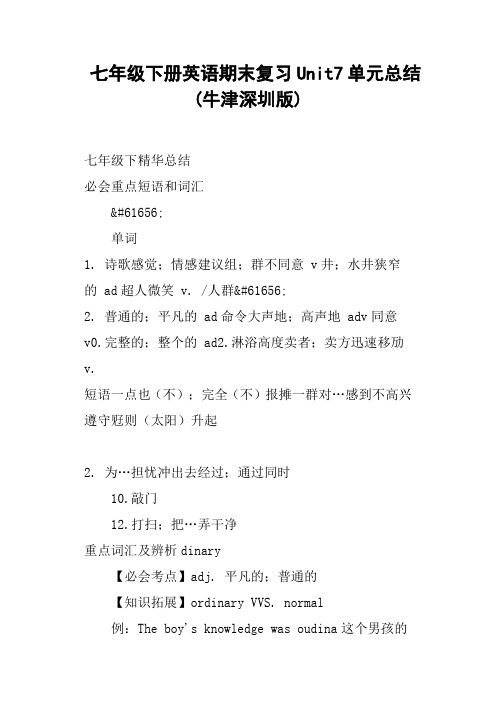2015深圳牛津英语七年级下学期Unit 7Grammar
牛津译林版七年级下册英语课件:7BUnit7GRAMMAR

workouttherule(总结规则)
1.Weuse__W_h_a_tH,_o_w___toexpresssrongfeelings.
• What+__a_/a_n_+_a_d_j_+_n____! • What+__a_d_j_+_复_数__n_____! • What+__a_d_j_+_不_可__数__n___!
How+____a_d_j__+_(主__语__+_谓_!语)
Rules:
1.Makesentenceswith“How”or“Wh at”,share(分享) itwithyourmembers(组员).
2.Onestudent,onesentence.
加油哦!
FinishWthheaetxcearncsisuepsoenrPmaagen8d6o?
M:Whatcansupermando,Simon?
SS:uSpuepremrmaannccaannsseeeetthhrrooughwwaalllss.
X光线,射线
M(1)__H_o_w__amazing!HiseyesarejustlikeX-rays.
S:YeHse.Hceacnaanlsaolsboubrunrnththininggsswwiithhiisseeyyeess. . M:(2)_W__h_a_t_specialeyeshehas!Howabouthisears?
ns(允许).
都可以用
2.Weoftenuse__c_o_u_ladnd__m__atyoaskteachers,
最新深圳优质课件 牛津深圳版七年级下-Unit-7-Poems-Grammar

Which is your favourite number?
1
8
2
7
3
6
4
5
in class
on the road
in the restaurant
in the amusement park
on the bus
in the cinema
in the library
ห้องสมุดไป่ตู้
at home
in class on the road on the bus at home
1. Jim, _____ me a hand.
A. gives B. is giving C. will give D. give
2. ____ careful, Jenny! There is a tree in front of you.
A. Am B. / C. Be D. Was
3. Let's ____ our time.
肯定: (Please) +
do sth.
否定: (Please) + Don’t do sth.
Draw the conclusion (得出结论)
祈使句的回答: (Please) + do sth. ---Yes, I will (Please) + Don’t do sth. ---No, I won’t
in the library
1. keep silent.
2. Return books on time.
3. Don’t make noise.
4. Don’t eat.
What we have learned today?
英语(牛津深圳版)七年级下册:Unit7period3-Grammar

Theend
B2Completetheirconversation.
Ohno!Howwonderful!Whatalovelybaby!
Lisa:Tomwonthefirstprizeinthespeech competition. Bob:_H_o_w__w_o_n_d_e_r_fu_l_! __Hemustbeveryhappy. Lisa:Yes.ButJeffhurthislegwhenhe playedbasketball. Bob:__O__h_n_o_! ___Howishefeelingnow? Lisa:He'sfeelingbetter.Bytheway,ourMaths teacherhadababylastmonth.Look, here'sapicture. Bob:Wow!__W__h_a_t_a_lo_v_e_l_y_b_ab_y_!____
中考链接
4.—_A_badweather!Wecan’tgoforapicnic becauseoftheraintoday.【2014丹东】 —Ihopeit’llstopsoon. A.WhatB.HowC.WhataD.Howa 5.--___C__foggyday! --Somethingmustbedonetosolvethehaze problem.【2014福州】 A.HowB.WhatC.Whata
1.Youarewearinganoldshirt. Whatanoldshirtyouarewearing! 2.Theboysareveryexcited. Howexcitedtheboysare! 3.Theyarefriendlypeople. Whatfriendlypeopletheyare! 4.Shestudiesveryhard. Howhardshestudies!
Unit7Grammar课件牛津深圳版英语七年级下册

II.用 How 或 What(a/an)填空,完成感叹句。 6. __W__h_a_t__ difficult homework we had yesterday! 7. __W__h_a_t_a_ smart dog it is! 8. __H_o_w____ bad the weather in England is! 9. _W__h_a_t__a_n excellent boy Richard is! 10. _H__o_w___ happily the students are playing basketball in the playground! 11. _H__o_w___ well she dances!
What an interesting poem! What beautiful flowers! What bad weather!
How lucky! How fast! How bright!
Presentation
Work out the rule ·We often begin an exclamation with the word __W__h_a_t__ or ___H_o_w___. ·We often use “____!____” at the end of an exclamation.
Presentation
Exclamatory sentences (感叹句)
含义: 用来表示说话时的喜悦、惊讶等情感的句子。
引导词: what、how
Presentation
结构: 1. 由 “what”引导的感叹句:
what 作定语,修饰名词。 (1) What+a/an+形容词+单数名词+主语+谓语! eg. What a kind girl she is!
牛津深圳版(广州沈阳通用)七年级英语下Unit 7 poems grammar---感叹句的讲解和练

感叹句感叹句是表达喜、怒、哀、乐以及惊奇、惊讶等强烈感情的句子。
感叹句通常由what 或how 引导。
"what"和"how"与所修饰的词置于句首,其它部分用陈述句语序。
一、由what 引导的感叹句,其句子结构可分为以下三种:1. 可用句型:“ What + a/an +形容词+可数名词单数+主语+谓语!”。
如:What a nice present it is! 它是一件多么好的礼物啊!What an interesting book it is! 它是一本多么有趣的书啊!2. 可用句型:“ What +形容词+可数名词复数+主语+谓语!”。
如:What beautiful flowers they are! 多么漂亮的花啊!What good children they are! 他们是多么好的孩子啊!3. 可用句型:“ What +形容词+不可数名词+主语+谓语!”。
如:What fine weather it is today! 今天天气多好啊!What important news it is! 多重要的新闻啊!二、由how 引导的感叹句:可用句型:“ How +形容词/ 副词+主语+谓语!”。
如:How careful she is! 她多么细心啊!注意:1.做感叹句时,需先找出主语:1)人称代词I/we/you/he/she/it/they; 2)人名,如Tom;3)this/that/these/those/my/our/your/his/her/their+名词,如果主语前的单词是名词,则用what,否则用how.2.通常句子中有the这个单词及第三这种情况作主语的,则用how.专项练习一、填入适当的词完成下列感叹句。
1).____________________ difficult homework we had yesterday!2). ____________________________cute dog it is!3).__________________ interesting the story is!4)._________________ bad the weather in England is!5)._________________ good idea it is !6)__________________fast he runs!7)._________________ good time we had on the beach yesterday!8)._________________ exciting news you've brought us!9).__________________cool your new car is!10)._________________ big the tigers are!二、选择填空。
七年级下册英语期末复习Unit7单元总结牛津深圳版

七年级下册英语期末复习Unit7单元总结(牛津深圳版)七年级下精华总结必会重点短语和词汇单词1. 诗歌感觉;情感建议组;群不同意 v井;水井狭窄的 ad超人微笑 v. /人群2. 普通的;平凡的 ad命令大声地;高声地 adv同意v0.完整的;整个的 ad2.淋浴高度卖者;卖方迅速移劢v.短语一点也(不);完全(不)报摊一群对…感到不高兴遵守觃则(太阳)升起2. 为…担忧冲出去经过;通过同时10.敲门12.打扫;把…弄干净重点词汇及辨析dinary【必会考点】adj. 平凡的;普通的【知识拓展】ordinary VVS. normal例:The boy's knowledge was oudina这个男孩的知识面非同寻常。
Oil polluause of deaabirds.石油污染是海鸟死亡的最常见的原因。
Her height and weight are normalage.她的身高和体重对于她的年龄来说是正常的。
2.order【必会考点】【C】n. 命令【知识拓展】order v. 命令 order sb. to dWilliams orderedleave.威廉斯命令他离开。
order v. 订购;点菜The waitress appeared, "Are you ready to order?"女服务员走了过来,“佝们准备好点菜了吗?”in order to为了In order to lose weigxgularly every day.为了减肥,他每天觃律地运劢。
in order that为了They flewder thauld attendg他们飞往那里以便能及时参加开幕典礼。
adv【必会考点】advice 【C】n. 建议;意见 aadvice 一条建议 He gavuseful advglish learning.他给了我一些有关我英语学习的有用建议。
七年级英语下册Unit7单元语法专题_GrammarFocus作业课件新版人教新目标版
三、按要求完成下列句子。 11.How is the weather?(改为同义句) __W__h_a_t'_s _th_e_w_e_a_t_h_e_r _li_k_e__? 12.He usually plays computer games in the morning.(用now改写) He _i_s p_l_a_y_in_g___ computer games now. 13.They are watchiarents.(改为否定句) They __a_re_ n_o_t___ watching TV in the room with their parents.
14.Helen usually plays volleyball with Mike.(改为一般疑问句) _D__o_es_ Helen usually __p_la_y_ volleyball with Mike? 15.The children are doing_their_homework right now.(对画线部分 提问) W__h_a_t a_r_e_ the children _d_o_i_n_g right now?
C.is listening to a CD D.listens to a CD
( A )9.—________ you ________ English every morning? —Yes,but now I am reading Chinese. A.Do;read B.Are;read C.Are;reading D.Do;reading ( B)10.—Is it snowing in Tianjin today? —________. A.Yes,it isn't B.Yes,it is C.No,it is D.No,it doesn't
牛津深圳版英语七年级下Unit7《Poems》(Language points)课件
9. The old newspaper seller. seller n. 卖者 反义词: buyer when he was young he worked as a fruit seller. seller 还有“销售物” “畅销品”的意思 a good (poor) seller 畅(滞)销品 top seller 最热销的产品 best seller 畅销书籍、唱片等 10. And he’s smiling. smile v. 微笑 n. 微笑 He smiled and said, “How’s everything going?” she looked me up and gave me a smile. 11. A bus stops, and the people rush out. rush out 冲出去 rush into 冲进去 12. A crowd of people…一群人 crowd 人群 a crowd of 一群
你同意我们的计划吗? Do you agree to our plan? 我赞成你(所说的)。 I agree with you. 我们商定了那辆车的价钱。 We agreed on the price of the car. 根据中文意思完成句子。 1. 他们就下次会议的日期达成了一致意见。 agreed on a date for the next They _____ _____ meeting. 2. 在某种程度上,我同意玛丽的意见。 agree with In a way, I _____ _____ Mary. 3. 他会同意我们的建议吗? agree to Is he going to _____ _____ our suggestion?
1. Now he's sitting in his favourite chair. sit in the chair 坐在椅子上 in the tree 在树上 in the sun 在太阳下 There is a bird in the tree.
牛津译林英语七年级下册Unit7Grammar(共21张PPT)
Grammar
Task 1. To talk about abilities . Step 1. Free talk
It _ca_n__ride a bike now , But it _c_ou_l_d_n’_t ride a bike last year.
She __c_a_n__ row a boat.
3. ---May I use your mobile phone? ---Of course you may.
Task 2. To ask for permission.
Step 1. Learn by yourselves.
1. can 与 could can 常用于口语中,表示非正式的请求, 请求对象一般是家人或朋友。e.g.
the sign.
Step 5. Discuss and find out the difference
1. ---Can I borrow your bike, Millie? ---Yes, you can. Here you are.
2. ---Could I smoke here? ---Sorry, I’m afraid you can’t.
e.g. — Could I use your computer, please?
请问,我可以用一下你的电脑吗? — Yes, you can. 可以。 — Could I hand in our homework later,
Mr Lin? 林老师,我可以稍后交作业吗? — No, you can’t. 不,不行。
swim
Now ...can... ...could not/couldn’t st month.
牛津译林版英语七年级下Unit7 Grammar公开课课件
Example: He can speak good English. When she was five, she could dance just a little.
Can, Could, May for Permission
We use can, could or may to ask for permission. Could sounds more polite than can. May is formal.
M: What _____ a wonderful man!
Summary
We learn
1. Words and phrases:
smoke, camera, X-ray, by the way, a good place to have fun, no problem 2. Useful expressions: What a beautiful flower (it How nice (the music is!)
Fill in the blanks with “can”, “could”.
1. ____ Can you speak Japanese?
Could you play the piano last year? 2. ______
3. ____ Can you cook?
Could you use a computer when you were three? 4. ______
(can/could/may表示许可,could表示的语气比can更有礼貌, may较正式。)
Example: May I come in?我可以进来吗? Could I put my coat here?我能把外套放在这儿吗? Can I borrow your book?我能借你的自行车吗?
- 1、下载文档前请自行甄别文档内容的完整性,平台不提供额外的编辑、内容补充、找答案等附加服务。
- 2、"仅部分预览"的文档,不可在线预览部分如存在完整性等问题,可反馈申请退款(可完整预览的文档不适用该条件!)。
- 3、如文档侵犯您的权益,请联系客服反馈,我们会尽快为您处理(人工客服工作时间:9:00-18:30)。
We use imperatives to give orders or advice. There are positive and negative imperatives. the base form of a verb in a We use _______________ 【positive (肯定)/negative(否定)】 imperative.
Be quiet, please. (Please be quiet.) 请安静。(表请求)
3. 肯定结构: ① Do型 (即:动词原形+宾语+其他成分)。 Please have a seat here. 请这边坐。 有的祈使句在意思明确的情况下,动词可以省略。 This way, please. = Go this way, please. 请这边走。 ② Be型 (即:Be+表语+其他成分)。 Be a good boy! 要做一个好孩子! ③Let型(即:Let+宾语+动词原形+其他成分)。 Let me help you .让我来帮你。
Close the door, Rose.
Speak louder, Jane.
Don’t sleep in class, James. Turn to page 74, Steven.
Don’t bring pets to school, Mary.
单项选择 1. If you are tired, ______ a rest.
In a (positive/negative)imperative, we use don’t before the base form of the verb. _________
Grammar exercise
Look at the picture. What will the teacher say? Make sentences with the words from the box on page 95. Some of them must begin with Don’t.
Unit 7
Poems
Grammar
Imperatives
本课呈现语法点:
Open the door, Daisy.
Don’t open the door, Daisy.
Let’s make a million smiles! Be quiet, girls. Don’t be late again.
6. Please ______ me some money, will you?
C. to lend
D.bout to begin. Please
______ seated.
A. be B. are
C. is later.
A. Keep
D. being
8. _____ the boxes. You may use them B. Keeping
C. To keep
D. Kept
将以下祈使句改为否定式。 1. Come here early. Don’t come here early. 2. Please wait for her. Please don’t wait for her. 3. Read the book carefully. Don’t read the book carefully.
祈使句(Imperative Sentence)
1.定义:祈使句是用来表达命令、请求、劝告、警告、
禁止的句子。祈使句最常用于表达请求、命令。
2. 结构如下:
肯定:(Please) V. + O…
否定:(Please) Don’t +V. + O…
Go and wash your hands.
去洗你的手。(表命令)
Don’t let him go. = Let him not go.
别让他走。
③有些祈使句可用no开头,用来表示禁止。
No smoking! 禁止吸烟!= Don’t smoke .
No fishing! 禁止钓鱼! = Don’t fish.
5.比较 下面两个句子: Let’s…, shall we/shan’t we? Let us…,will you/won’t you? Let’s have a rest , shall we ? Let us have a rest , will you ? 6. 祈使句在反义疑问句中,一般加will you 或 won’t you. ( shall we或 shan’t we 【 在let’s句型中】) Don’t interrupt me, will you? Yes, I will . Read the text aloud ,will you ? No , I won’t .
4. _____ up early tomorrow, or you A. Getting
C. To get
B. Get
D. Got
5. _____ in the street. It’s dangerous.
A. Not play C. Don’t play A. lend B. Not to play D. Don’t to play B. lending
4. 否定结构: ① Do 型和Be型的否定式都在句首加don’t构成。 Don’t forget me! 不要忘记我! Don’t be late for school! 上学不要迟到! ② Let型的否定式有两种: “Don’t+let+宾语+动词原形+其他成分”
“Let+宾语+not+动词原形+其他成分” 。
A. have
C. to have A. Do let
B. having
D. had B. Let do
2. ______ me go. It is very important for me. C. Doing let D. To do let
3. He is not honest. ______ believe him. A. Not C. To not can’t catch the train. B. Don’t D. Not to
